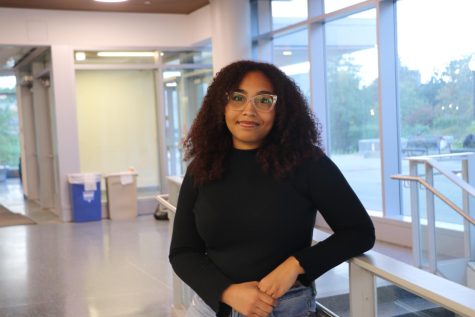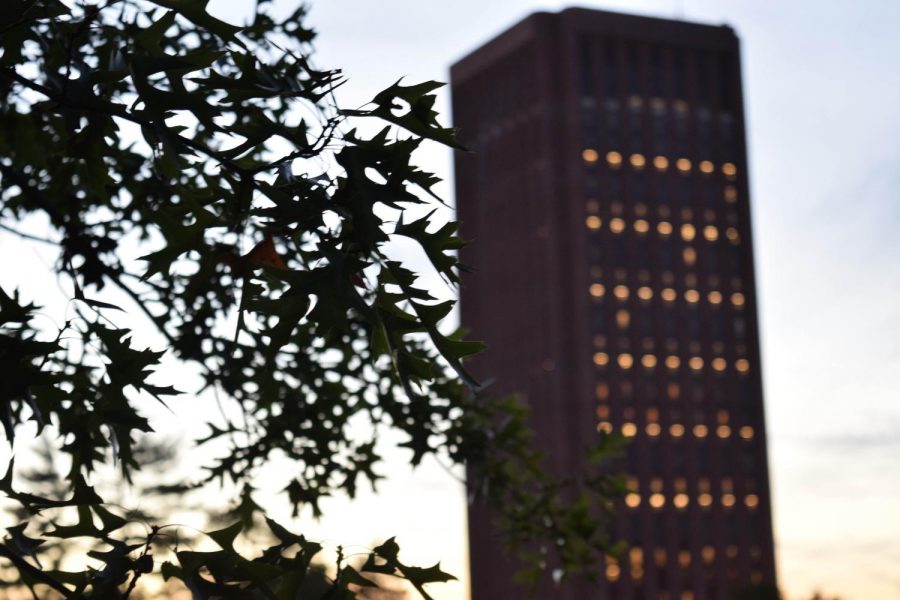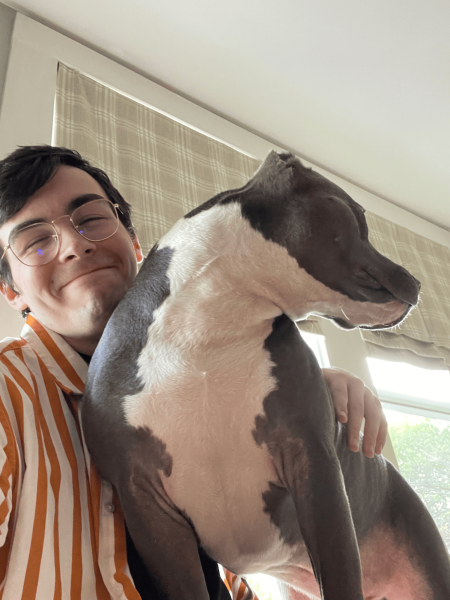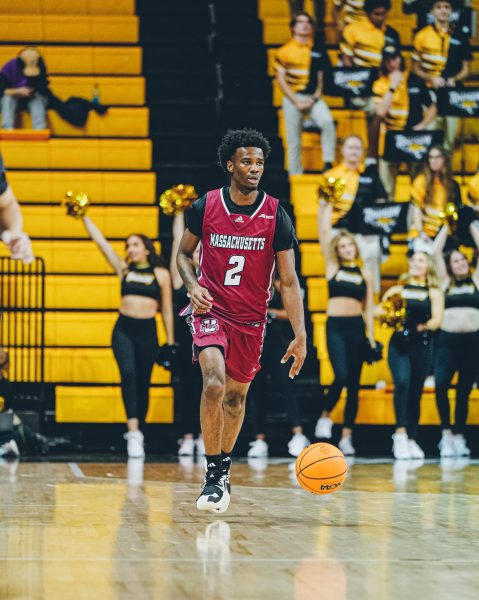Finding Comfort in the Minority
Black students at UMass confront a lack of diversity, a sense of unfamiliarity, and unresolved issues of longstanding racism.
“It definitely angered me—not just that it was done—it was done in the protection of the night,” said Clement Boaheng, a third year graduate student in Health Policy and Management at the University of Massachusetts Amherst. “Posting things on a door when nobody is able to witness it is pretty cowardly.”
Boaheng attended UMass for undergrad as well. In his first year, an e-board member, Josh Odam of the Black Student Union, which Boaheng was a part of, received a note on his dormitory door that said “Kill all N*****s”.
Feeling out of place is common for some POC/Black students at UMass. These are students on campus who know what it’s like to be the only one who looks like them in the room. To be consistently misunderstood. To be the victims of microaggressions. To be constantly looking over their shoulder. To fear that people look at them differently.
Navigating young adulthood and college life is challenging enough, nevermind the added pressure of regularly evaluating one’s non-white identity in white spaces.
***
UMass Amherst is the largest state college Massachusetts has to offer with over 24,000 undergraduate students. The undergraduate student population at the flagship campus is 67.5% white, according to the fall 2021 campus data.
Black students make up 5.4% of the undergraduate population.
UMass has had its issues with racism and racial incidents more consistently throughout its last 50 years, with former Chancellor Richard D. O’Brien (1991-93) calling UMass a “racial tinderbox” in 1992. This label came a few weeks after human feces was found outside of a Black student’s room—and six years following an incident when a Black student was beaten and other students were injured, after a brawl broke out between approximately 3,000 students who were watching the World Series game between the New York Mets and the Boston Red Sox. When the Mets, viewed as the “Black” team, defeated the Red sox, the brawl started.
Now in the almost post-pandemic era of the university, the Administration is working on building community after racist emails targeted Black student groups and individual students last fall and spring. The emails, sent anonymously, featured explicitly racist language, including calling for the sterilization of Black people, and cursed the Black UMass community with harmful stereotypes.
Incidents like these have left Black students feeling disappointed and uncomfortable, with other POC students on edge.
***
Kayla Dame, a senior dance major, was “on cloud 9” last fall when she transferred to UMass from Bridgewater State University. But she said that excitement turned to “skepticism” when she noticed she was the only Black student at the dance program audition.
The emails were sent during the start of her first semester here as a student.
“I felt weird walking around campus–that people were laughing at me or judging me or saying ‘You don’t belong here, you should just drop out because you are taking spots from the white kids’. So it made me feel like an outsider,” Dame said.
Dame explained that she doesn’t feel comfortable on campus due to lack of diversity across the board in terms of an unrepresentative student staff and faculty population.
“When you’re in a big school that’s majority white, it’s sometimes hard to find that comfort,” Dame said.
***
Boaheng said that he now feels comfortable on campus, after more than five years of being a student at UMass.
But it’s been a process. Coming from a diverse Black and Latinx neighborhood in Worcester, Boaheng explained that he was always around people that looked like him.
“I turn left and right and I mostly see white faces—I don’t consider this school diverse,” said Boaheng.
Last year during the racist email situation, Boaheng made it a mission to check in on the Black students and those in the community.
During his first years in grad school, he felt like it was his “responsibility to put the needs of students of color in that department on the radar of admin and decision makers in the program.”
“I still do advocacy work in different ways, but the advocacy work was getting in the way of my studies—taking a step back from that work has allowed me to fully step into just being a graduate student, which many students of color aren’t really allowed to do because they take on this extra work,” he explained.
Even students who come from places that aren’t as diverse feel unsettled at times. Sophomore sociology student Preston Jackson-Stevens was halfway through his first month at UMass when the emails were sent. Jackson-Stevens described his experience at UMass to be comfortable and more diverse than his overwhelmingly white hometown in Belmont, Massachusetts. However, last year’s email incident left him taken aback.
“I said I feel comfortable here, that doesn’t mean that every second of the day I don’t think about me being a Black man on this campus,” he explained. “That’s something I have to think about, because we don’t have that privilege not to think about it. No one else is going to speak up for us but us. No one’s going to defend us but us. We only have ourselves.”
A year later, students are still affected by the incident, in which they are hyper aware of their identities on campus. Samantha Gallant, a senior English major, reflected on their experience saying, “I think it’s something that has existed in the back of my mind, I walk on campus differently and feel an underlying sense of discomfort—but that incident specifically pulled some weight with me.”
As for solutions, Gallant thinks finding those responsible for the emails is important, but not as much as Administration taking a deeper look into UMass and how these incidents continue to happen.
***
Administration is currently working to unify and improve community connections.
Last fall, Administration announced the creation of the Black Advisory Council (BAC), a group of faculty, staff and students dedicated to “addressing topics related to the Black community at UMass.” In addition to creating the council, Administration invited those within the UMass community to participate in the Campus Climate Survey (CCS), which aimed to help understand challenges and gather solutions for a more “respectful and inclusive campus environment.”
According to Chancellor for Diversity, Equity and Inclusion Nefertiti Walker, Administration is using the results of the survey to plan next steps.
Walker expressed that she and other administrative staff meet with Black students frequently and work with student leaders from the Student Government Association and the Graduate Student Senate.
Some of the students interviewed for this story suggested there should be more forums for Black students and Administration to communicate and work towards understanding. Walker said that she liked “the idea of creating some recurring space where these conversations can carry on,” as well.
Walker suggested that students and staff speak with the BAC as well as other Chancellor Student Advisory Boards in regards to their experiences and suggestions.
To Black and POC students who may feel out of place on campus, Walker said, “This is your campus, own it. Take up space. Be your authentic self. Demand equity. Demand to be treated fairly. Demand to have a classroom climate where you feel included. Make these demands of me. Push the Provost, the Chancellor, Deans, your faculty. Demand more out of us.”
In addition, she explained that non-Black community members also have a responsibility to make campus more inclusive, saying, “it’s not the job of Black students only to call out anti-Black racism.”
Walker also stressed the importance of Black/POC students finding joy at UMass, “Be happy. Play music, dance. Find clubs. Live a fruitful, joyful college experience,” she said. “College is about so much more than the toxic climate, and if you’re not careful, that stuff can weigh you down.”

"Success is liking yourself, liking what you do, and liking how you do it" -Maya Angelou











